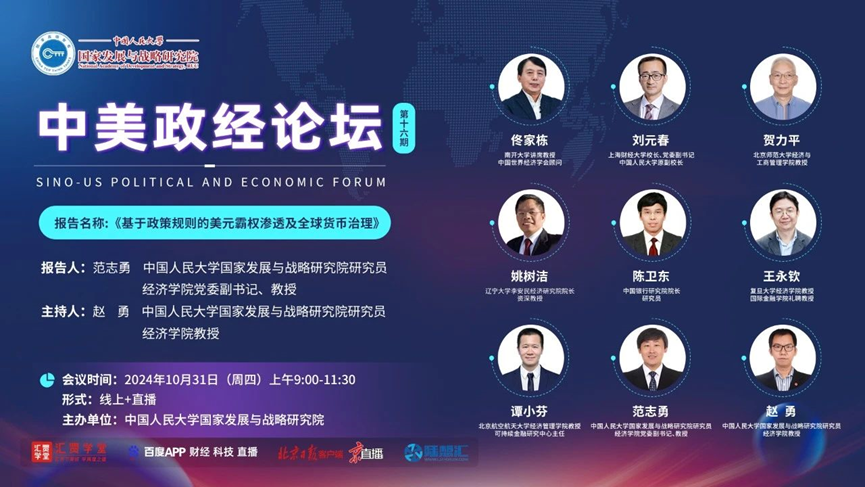 Research Update
Research Update
14
Nov
On October 31, the 16th Sino-US Political and Economic Forum, hosted by the National Academy of Development and Strategy at Renmin University of China, was held online. As two major global powers, the political and economic interactions between China and the United States have significant impacts on both countries and the world, making research on strengthening U.S.-China relations particularly important. To this end, the National Academy of Development and Strategy established the Sino-US Political and Economic Forum, aiming to create an interdisciplinary academic and think tank platform. This forum regularly organizes teams to delve deeply into key issues, publish the latest academic findings on Sino-US relations, and invites academic peers to discuss and exchange ideas, supporting scholarly research on the United States and Sino-US political and economic relations. The forum was livestreamed by several major media platforms, including Baidu, Beijing Daily, and etc.
The forum was chaired by Zhao Yong, a researcher at the National Academy of Development and Strategy and a professor at the School of Economics at Renmin University of China. Professor Fan Zhiyong, Deputy Party Secretary of the School of Economics and a researcher at the National Academy of Development and Strategy, authored a report titled “Dollar Hegemony Penetration and Global Monetary Governance Based on Policy Rules”. Prominent experts and scholars in the field, including Chen Weidong, He Liping, Tan Xiaofen, Tong Jiadong, Wang Yongqin, and Yao Shujie, contributed their analyses.
In the first session, Fan Zhiyong’s report covers the following parts:
1. Preface
2. The “Disconnection” of U.S. Domestic and External Balances and the Widening External Imbalance
3. Global “Stabilization” Mechanism Based on the Transformation of Monetary Policy Frameworks
4. The Reverse Impact of Monetary Policy Framework Transformation on the Evolution of Global Monetary Governance
5. Comparison of Global Monetary Governance Reform and Collective Transformation of Monetary Frameworks
6. Integrated Global Economic Governance and China’s Role
7. Conclusion
In the second session, experts shared their insights on the U.S. dollar-dominated monetary hegemonic system and global monetary governance.
(Translated by ZHANG Yuqing; Proofread by YANG Fanxin)